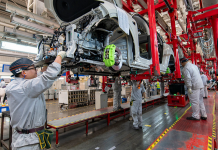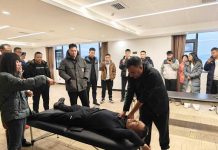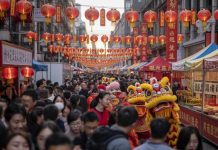
In his recent talks with visiting Comorian President Azali Assoumani in Beijing, Chinese President Xi Jinping brought up a Chinese TV series that resonated deeply in both China and Africa. The show has been broadcast in some 50 countries and regions including the Comoros.
Known as Minning Town, the series carries the more poetic Chinese title, Shan Hai Qing, or “Friendship Across Mountains and Oceans,” which highlights the collaborative anti-poverty efforts between Fujian Province in southeast China and Ningxia Hui Autonomous Region in the northwest in the 1990s.
Based on real-life events in Xihaigu, a remote and impoverished mountainous area in Ningxia, the series depicts the relocation of villagers from barren mountains to a more hospitable area called Minning Town, located near the Yellow River, with assistance from wealthier Fujian. A technology known as juncao, which was developed in Fujian and uses a type of hybrid grass for mushroom cultivation, animal feed and soil erosion control, was introduced in Minning, allowing the relocated residents to develop a mushroom industry and lift themselves out of poverty.
Around the same period, this innovative technique was introduced to the African continent and has since become established in over 40 African countries.
The transfer of the juncao technology is part of China’s broad commitment to helping African nations develop the infrastructure, industries and human resources needed to break the cycle of poverty through targeted investments, knowledge sharing and capacity building.
“As China and Africa move forward together, the enduring friendship stands as a testament to their shared vision—a future where the mountains of poverty are leveled, and the seas of opportunity are navigated hand in hand, leading to a horizon of shared growth and development,” a commentary by Xinhua News Agency read.
When delivering a keynote speech at the opening ceremony of the 2024 Summit of the Forum on China-Africa Cooperation (FOCAC) on September 5, Xi said the friendship between China and Africa transcends time and space, surmounts mountains and oceans, and passes down through generations.
The FOCAC is an effective platform and multilateral mechanism for China and African countries to conduct collective consultations and carry out pragmatic cooperation.
The founding of the FOCAC in 2000 was a milestone in the history of China-Africa relationship. Over the past 24 years, especially in the new era, China has advanced hand in hand with our African brothers and sisters in the spirit of sincerity, real results, amity and good faith, Xi added.
This year’s summit gathered heads of state, government leaders and representatives from China and more than 50 member countries of the FOCAC, along with the chairperson of the African Union Commission, the secretary general of the United Nations, and heads of several international organizations.
It was not only the largest diplomatic event hosted by China in recent years but also became a landmark in the history of China-Africa exchanges and of those among countries in the Global South.

Toward modernization
From the establishment of the African Centers for Disease Control to the construction of railways linking East Africa, from Rwanda’s thriving e-commerce platforms to Mozambique’s flourishing agricultural parks, China has completed a large number of impactful projects in Africa.
China has helped Africa build and upgrade more than 10,000 km of railways, approximately 100,000 km of roads, around 1,000 bridges and nearly 100 ports, and improved power supply and communication networks for many countries on the continent.
China is the developing country with the largest investment in African countries, and has been the largest trading partner of African countries for 15 consecutive years. Hans Seesaghur, former Economic and Commercial Counselor at the Embassy of Mauritius in China and former China chief representative at the Mauritius Economic Development Board Representative Office in Shanghai, told Beijing Review that he believes China and Africa have the same historical mission: to achieve robust development to improve the wellbeing of their peoples.
China’s imprints are evident and vivid in infrastructure improvement, rapid industrialization and all progress in small and medium-sized enterprises in our countries,” Tanzanian President Samia Suluhu Hassan said at the opening ceremony. She called on African countries to work with China toward fruitful socioeconomic innovations and development.
The partnership between China and the African continent is “the main pillar of South-South cooperation,” UN Secretary General António Guterres said while addressing the opening ceremony. “Your joint efforts, based on the United Nations Charter, can create new momentum for African development.”
The two sides can “drive the renewable energy revolution,” which can be “a catalyst for key transitions in food systems and digital connectivity,” Guterres said, adding that Africa can maximize the potential of China’s support in areas from trade to data management, finance and technology.
Xi said in his keynote speech that the joint pursuit of modernization by China and Africa will set off a wave of modernization in the Global South and open a new chapter for building a community with a shared future for humanity, calling for advancing modernization that is just and equitable, is open and win-win, puts the people first, features diversity and inclusiveness, is eco-friendly, and is underpinned by peace and security.
“China and Africa account for one third of the world’s population. Without our modernization, there will be no global modernization,” he said.
The Beijing Declaration on Jointly Building an All-Weather China-Africa Community with a Shared Future for the New Era was adopted at the just-concluded FOCAC summit.

Substantial actions
Through joint efforts under the frameworks of the FOCAC, the China International Import Expo and the China-Africa Economic and Trade Expo, China and Africa have made continuous and solid progress in fields such as industry, agriculture and healthcare, epitomizing the resilience and vitality of African countries and their relations with China, Seesaghur said.
Seesaghur is expecting Mauritian Victoria pineapples, benefiting from a zero tariff rate through the Mauritius-China Free Trade Agreement, to make their debut in China at the forthcoming Seventh China International Import Expo in Shanghai in November. This would be facilitated by the “green channel” for African agricultural products entering China established during the Eighth Ministerial Conference of the FOCAC in November 2021, Seesaghur said. The arrangement has helped expedite inspection and quarantine processes and expand tariff exemptions.
A three-year action plan adopted at the summit proposes 10 initiatives in mutual learning among civilizations, trade prosperity, industrial chain cooperation, connectivity, development cooperation, healthcare, rural revitalization and people’s wellbeing, people-to-people exchanges, green development and common security.
To implement the 10 partnership initiatives, the Chinese Government will provide 360 billion yuan (roughly $50 billion at the current exchange rate) of financial support over the next three years, in the forms of a 210-billion-yuan ($29.6 billion) credit line, 80 billion yuan ($11.2 billion) of assistance in various forms, and at least 70 billion yuan ($9.8 billion) of investment in Africa by Chinese companies, Xi said.

The initiatives cover basically all aspects of modernization, reflecting China’s confidence and sincerity in promoting modernization with Africa, Song Wei, a professor at the School of International Relations and Diplomacy at Beijing Foreign Studies University, told newspaper Global Times.
China will voluntarily and unilaterally open its market wider and has decided to give all the least developed countries having diplomatic relations with China, including 33 countries in Africa, zero-tariff treatment for 100 percent tariff lines. China is the first major developing country and the first major economy to take such a step, which will help turn China’s big market into Africa’s big opportunity, Xi said.
Over the next three years, China will send 2,000 medical personnel and public health experts, and 500 agricultural experts, implement 20 healthcare and malaria treatment programs, and 30 clean energy and green development projects, encourage Chinese businesses in Africa to create no less than 1 million local jobs, and provide 60,000 training opportunities with priority given to programs for women’s empowerment and youth development, according to the action plan.
The initiatives will also facilitate technological and knowledge transfers, bridging gaps and encouraging innovation, Adetoro Banwo, Deputy Director of the Confucius Institute at the University of Lagos, Nigeria, said.
Munetsi Madakufamba, Executive Director of the Zimbabwe-based Southern African Research and Documentation Center, said he is impressed by the mechanisms for increasing experience sharing on national governance mentioned in the action plan.
By inviting 1,000 members of African political parties to China for exchanges, China is offering an alternative for Africa to benchmark on and to see how this can be adapted to each country’s own national conditions, Madakufamba told Global Times.
The new practical measures announced by Xi are further proof of his constant determination to raise China-Africa cooperation to a higher level, said Senegalese President Bassirou Diomaye Faye.

The China-built Phase I of Kribi Deep Seaport in Kribi, Cameroon, on October 11, 2022 (XINHUA)
Helping hand or ‘debt trap’?
The lack of modern ports, energy infrastructure, and national and cross-border highways has long hindered Africa’s modernization. However, with infrastructure projects driven by FOCAC and China’s long-standing focus on development, Africa is now better positioned to achieve its industrialization potential, Mwangi Wachira, former World Bank economist and advisor to the Kenyan Government, told Xinhua.
However, fearing that deepening China-Africa cooperation will narrow the scope for Western countries to interfere in the internal affairs of African countries, some Western politicians and media outlets have been accusing China of setting a “debt trap” for African countries by partnering with them in their quest for development and investing in Africa, He Wenping, a researcher with the Institute of West Asian and African Studies at the Chinese Academy of Social Sciences, said.
“Debt trap” is a term to describe an international financial relationship where a creditor country or institution extends debt to a borrowing nation with the intention of extracting economic or political concessions when the debtor country becomes unable to meet its repayment obligations.
These Western politicians and media outlets conveniently ignore the fact that cooperation with China has boosted African countries’ economic development and created tens of thousands of new jobs, He said, adding that China’s investment and financing cooperation with Africa is nothing other than a growing “development pie.”
According to the International Debt Report 2023, released by the World Bank, multilateral and private creditors accounted for 80 percent of Africa’s total external debt in 2023, while China-Africa bilateral debt made up only 11 percent.
“This demonstrates that China has never been the main creditor of Africa,” Shen Xiang, Director of the Department of Western Asian and African Affairs at the Chinese Ministry of Commerce, said in August.
Even so, China has always actively helped Africa ease its debt repayment pressure through bilateral and multilateral channels. A paper published by U.S.-based Johns Hopkins University last year found that among the 46 countries participating in the Debt Service Suspension Initiative (DSSI) launched by the World Bank and the International Monetary Fund, Chinese creditors accounted for 63 percent of debt service suspensions between 2020 and 2021.
In contrast to the unfulfilled promises of debt relief by the Western countries, “China has been far more generous in providing relief to allow for African countries to manage their post-COVID recovery,” Charles Onunaiju, Director of the Center for China Studies in Nigeria, told Xinhua.
“China’s approach to debt relief has been more flexible, often involving the restructuring of loans to provide breathing space for debtor countries,” said Humphrey Moshi, Director of the Center for Chinese Studies at the University of Dar es Salaam in Tanzania. “In contrast, other creditors have been more rigid, prioritizing their financial returns over the economic recovery of African nations.”
The “debt trap” narrative is neither in the interest of other emerging economies nor that of China, Cavince said. “That is why, despite the hype, no African country is taking it seriously.” –The Daily Mail-Beijing Review news exchange item





